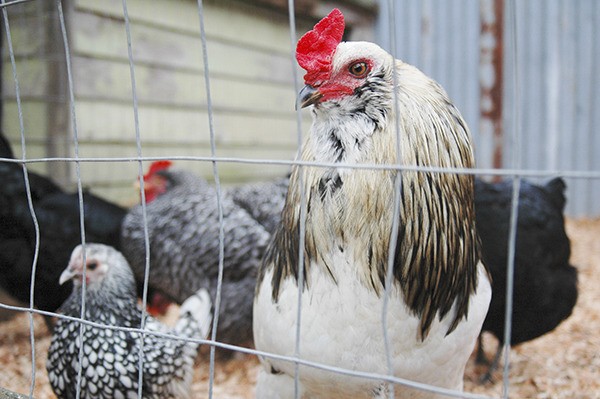In response to a confirmed case of avian influenza on Friday from a mixed flock of domestic poultry in Agnew, officials from both state and federal agencies with the Department of Agriculture are undergoing surveillance of the area and preparing to establish a quarantine zone surrounding the property.
The strain of avian flu found, H5N2, isn’t harmful to humans, but the concern is its ability to spread to additional domestic flocks, WSDA spokesman Hector Castro said.
On Sunday a team from the USDA euthanized 118 chickens, ducks and geese at 92 Cosmos Lane where multiple birds belonging to Sherry and Gary Smith fell victim to the avian flu.
The infected flock in Clallam County is the third case of avian flu found within domestic birds in the state following a similar quarantine conducted earlier in the year in Benton and Franklin counties.
However, the first case of avian flu within the state was detected in a wild duck in Whatcom County and again in a domesticated falcon, which had been fed wild duck.
Because the avian flu often is carried via wild ducks and spread through their feces, “there is definitely a concern that migratory pathways are a transportation mechanism,” Castro said.
The team of USDA officials is responding to the case in Agnew by conducting “enhanced surveillance” within a 3-kilometer radius of the property where the avian flu was detected. Team members are pursuing public outreach via door-knocking and voluntary testing of nearby domesticated flocks.
When testing waterfowl, a fecal sample is needed, but for other poultry a mouth swab is required, Castro explained.
“The sampling is quick and only takes a few seconds,” Castro said. “People walking around in white biohazard suits can be alarming, but it’s just extra precautionary gear.”
Federal officials collecting samples wear the disposable suits to reduce the risk of possibly transporting the highly contagious flu to perhaps a healthy flock.
Once samples are taken from surrounding birds, the samples are sent to both a Washington State University diagnostic lab in Puyallup and to a national lab in Iowa, Castro said. WSU’s lab is able to identify the presence of avian influenza, whereas the lab in Iowa can identify the type of strain.
Typically, a 10-kilometer or about 6.2-mile radius quarantine around the location of the infected flock is established and can last from a couple of weeks to a couple of months, Castro said. The maximum amount of a time a quarantine can be in place with an emergency rule like this is 240 days.
The quarantine will halt all poultry, eggs and other poultry products from being transported in or out of the quarantined zone.
In addition to the quarantine and voluntary testing, in an attempt to inform and educate the public and specifically bird owners, USDA officials likely will visit local feed and farm stores.
To help reduce the risk of contamination, Castro said Department of Agriculture officials are really pushing bird owners to carefully monitor their flocks and take precautionary measures, such as wearing a designated set of clothing when handling or interacting with their birds.
Both signs of respiratory discomfort and acting lethargic are symptoms to be aware of when monitoring birds, Castro said.
To report a sick or dead bird, call the WSDA Avian Health Program staff at 800-606-3056.
Reach Alana Linderoth at alinderoth@sequimgazette.com.


